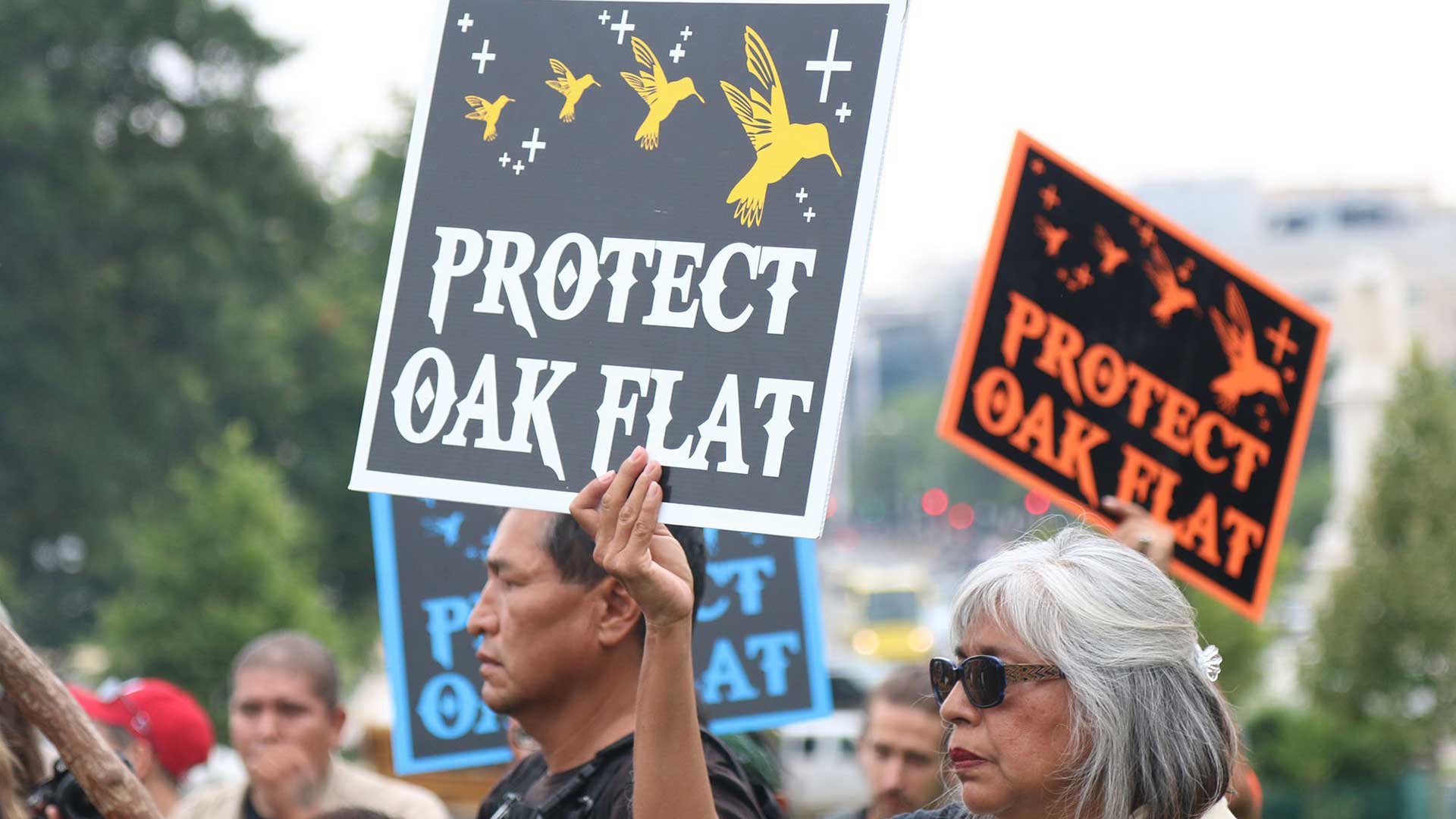 Protests against the Resolution Copper mine near Oak Flat have been going for years, as shown in this 2015 file photo from a rally at the Capitol.
Protests against the Resolution Copper mine near Oak Flat have been going for years, as shown in this 2015 file photo from a rally at the Capitol.
A Native American group that's trying to stop an effort to build one of the largest copper mines in the United States told a full federal appeals court panel Tuesday that the project would prevent Apaches from exercising their religion by destroying land they consider sacred.
U.S. federal government plans for a land swap that will allow Resolution Copper to build the mine will destroy the land in eastern Arizona known as Oak Flat, “barring the Apaches from ever accessing it again and ending their core religious practices forever,” said attorney Luke Goodrich, arguing for the group Apache Stronghold.
“We asked the court today to recognize the obvious — that when the government destroys a sacred site, religious liberty law has something to say about it,” Goodrich, vice president and senior counsel at the nonprofit legal institution Becket Law, said in a prepared statement distributed after the hearing in Pasadena, California. "A win for Apache Stronghold will be a win for people of all faiths.”
The Apache group is seeking to halt the land swap while the case plays out in court. The panel of 11 judges on the 9th U.S. Circuit Court of Appeals is expected to issue a decision in the next few months.
Called Chi’chil Bildagoteel, Oak Flat is dotted with ancient oak groves and traditional plants the Apaches consider essential to their religion. Apache Stronghold sued the U.S. government under the Religious Freedom Restoration Act, which prevents government agencies from placing a “substantial burden” on the practice of religion.
U.S. government attorney Joan Pepin argued that the act of Congress that approved the exchange giving the Oak Flat to Resolution Copper land supersedes the Religious Freedom Restoration Act.
The land transfer was a last-minute provision included in a must-pass defense bill in 2014. The swap would give the mining company 3.75 square miles (9.71 square kilometers) of national forest land in exchange for eight parcels it owns in other parts of Arizona.
Resolution Copper, a joint venture of global mining firms Rio Tinto and BHP, has said it continues to address concerns raised about the project, but noted there is significant local support for the mine. Rio Tinto has headquarters in Australia and the U.K, while BHP is based in Australia.
It says the project has the potential to supply enough copper to meet up to one-quarter of U.S. demand, adding up to $1 billion a year to Arizona’s economy and creating thousands of local jobs.
A smaller 9th Circuit panel previously ruled 2-1 that the federal government could give the Oak Flat land to the mining company for the project. The court later agreed to let the larger panel hear the case.
Apache Stronghold members traveled from Arizona for the hearing, stopping at cities along the way to draw attention to the case. They gathered Monday at a community arts center in the Los Angeles neighborhood of Boyle Heights.
“Oak Flat is where my people have come to connect with our Creator for millennia, and we have the right to continue that sacred tradition," Wendsler Nosie Sr. of Apache Stronghold said in a statement released after the hearing. “Today we stood up in court for that right, determined to stop those who think that our place of worship can be treated differently simply because it lacks four walls and a steeple.”
An environmental impact survey for the project has been pulled back while the U.S. Department of Agriculture has consulted for months with Native American tribes and others about their concerns. The environmental analysis will have to be republished before a swap of the Tonto National Forest land can go forward. The land swap would then have to be carried out within 60 days.
The Poor People’s Campaign, environmental groups, and the National Congress of American Indians are among many groups backing Apache Stronghold’s fight.
The Notre Dame Law School Religious Liberty Clinic filed a “friend of the court” brief and Stephanie Barclay, director of Notre Dame’s Religious Liberty Initiative, participated in oral arguments.
The Religious Liberty Clinic at the University of St. Thomas in St. Paul, Minnesota, also submitted a brief.
St. Thomas law professor Thomas Berg called it the most important Native American religious liberty case in 15 years.
“It could change the legal test used throughout the Ninth Circuit, which likely has far more sacred sites on federal land than any other part of the country," Berg said in a written statement.

By submitting your comments, you hereby give AZPM the right to post your comments and potentially use them in any other form of media operated by this institution.